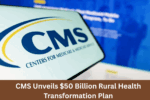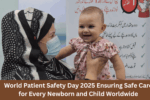Maternal and neonatal addiction is a growing concern in the United States, impacting thousands of families every year. Recognizing the urgent need for improved support, the federal government has recently approved new funding specifically aimed at addressing addiction care for pregnant women and newborns. This move marks a significant step towards better healthcare services and healthier futures for both mothers and babies.
The funding will help expand access to treatment programs, improve healthcare facilities, and train medical professionals to better handle addiction issues during and after pregnancy. In this article, we’ll explore what this new federal funding means, how it can improve addiction care, and why it’s essential for the wellbeing of families across the country.
Why Maternal and Neonatal Addiction Care Needs Special Attention
Addiction during pregnancy is a serious problem that affects both the mother and the baby. Mothers struggling with substance use disorders face challenges that impact their health, emotional wellbeing, and ability to care for their child. Babies born to mothers with addiction issues may suffer from neonatal abstinence syndrome (NAS), a condition where newborns experience withdrawal symptoms after birth.
Providing specialized care for these mothers and newborns is critical. Without proper support, the cycle of addiction and health complications can continue, leading to long-term consequences for families and communities. This is why targeted healthcare initiatives are necessary to break this cycle and help families heal.
Details of the New Federal Funding Initiative
The recent federal funding allocation focuses on several key areas. First, it aims to increase the availability of treatment programs that cater specifically to pregnant women with substance use disorders. This includes outpatient and inpatient services designed to support addiction recovery while prioritizing maternal and neonatal health.
Second, the funding is directed toward improving the training of healthcare providers. Medical professionals will receive updated education on best practices for treating addiction during pregnancy and caring for newborns experiencing withdrawal. Better-trained providers mean safer, more effective care for affected families.
How the Funding Will Impact Healthcare Facilities
Many hospitals and clinics are currently under-equipped to handle the specialized needs of mothers and newborns dealing with addiction. With the new funding, healthcare facilities can upgrade their infrastructure, acquire necessary medical equipment, and create dedicated units focused on addiction care.
These improvements will make hospitals safer and more supportive environments for families facing addiction. Mothers will have access to comprehensive services that address both their physical and emotional needs, while newborns will receive appropriate medical care to reduce complications associated with NAS.
Training Healthcare Providers for Better Support
Healthcare providers play a crucial role in the recovery journey of mothers and newborns affected by addiction. The new federal funds will be used to develop specialized training programs. These programs will teach medical staff about recognizing addiction symptoms, managing withdrawal safely, and offering compassionate care.
Increased knowledge among healthcare providers will lead to early intervention and better treatment outcomes. It will also help reduce stigma, encouraging more mothers to seek help without fear of judgment or punishment.
Community Programs and Support Services
In addition to healthcare improvements, a portion of the funding will support community-based programs. These services will focus on counseling, social support, and education for families affected by addiction. By involving communities, the initiative hopes to create a network of care that extends beyond the hospital setting.
Support groups, parenting classes, and outreach programs will empower mothers to maintain their recovery and build stronger family relationships. Community involvement is vital for long-term success and breaking the cycle of addiction.
Why This Funding Matters to Younger Generations
Many young people today are aware of the challenges surrounding addiction but may not know how deeply it affects families, especially mothers and children. This new federal funding is not just a healthcare improvement; it’s a chance to raise awareness and promote healthier choices among younger generations.
By improving addiction care for mothers and babies, the initiative helps create a brighter future where families thrive. It sends a message that help is available and that addiction does not have to define a person’s life or their family’s future.
Looking Ahead: The Future of Addiction Care in the US
The approval of new federal funding is just the beginning. Continued investment and attention are necessary to make lasting changes in how addiction care is provided to mothers and newborns. With ongoing support, healthcare systems can evolve to meet the unique needs of these families.
As awareness grows and more resources become available, we can expect better health outcomes and stronger families across the country. This federal initiative sets a hopeful example for other nations, including India, on how to tackle maternal and neonatal addiction with compassion and care.
Conclusion: A Positive Step Toward Healing Families
The new federal funding for maternal and neonatal addiction care represents a powerful commitment to improving the lives of mothers and babies struggling with substance use disorders. It will help build better healthcare services, train professionals, and support communities to provide the care these families need.
For younger readers and society as a whole, it’s a reminder that addiction is a challenge we can overcome with knowledge, compassion, and action. This initiative brings hope and support to families across the United States, encouraging healthier beginnings and stronger futures.




